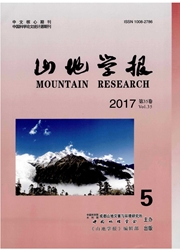

 中文摘要:
中文摘要:
探索简单、快捷的获得草地单个物种及群落地上生物量资料的方法,可以为合理保护和利用草地资源提供重要技术支持.在传统的直接收获法测定草地地上生物量的基础上,结合物种的种群特点,利用与生物量密切相关的高度、盖度、密度等植被生态参数,建立了青藏高原东缘高寒草甸各植物种的最适地上生物量估测模型.其中禾叶嵩草、垂穗披碱草、高山韭等物种生物量最适模型为幂函数方程,其他物种最适模型除却长毛风毛菊是二次项方程外均为线性方程.这些模型拟合精度较高,经检验,单个物种生物量估测值与实际观测值之间的相关系数均>0.9,且大部分平均相对误差<10%.对于草地群落地上总生物量,估测值与实际观测值相关系数为0.965,各样方的相对误差大都<10%,平均相对误差为5.672%,说明利用这些模型估算青藏高原东缘高寒草甸地上生物量切实可行.
 英文摘要:
英文摘要:
It was essential to find a rapid and accurate way to get information of single species and community aboveground biomass of the grassland, which can provide technical support for the reasonable management of mead- ow. Based on the traditionally harvesting method which was usually used to measure aboveground biomass of the grassland and the single species' population characteristics, our research established biomass estimation models of different 151ants using the ecological characters such as the height, the coverage and the density, the whole research was accomplished in the alpine meadows at Maqu County Gansu, China which is located in the east of the Tibet Plateau. Some species such as Kobresia graminifolia, Elymus nutans, Allium sikkimense, their best biomass estima- tion models were the power function equation. As for the other species their best biomass estimation models were the linear equation except Saussurea hieracioides whose best model was the quadratic term equation. All of the esti- mation models provided good statistics, and the results showed that the correlation coefficients of species biomass between the estimated value and the measured value were greater than 0.9 while most species biomass' average rel- ative errors were less than 10%. As for the community total biomass, the correlation coefficient between the esti- mated value and the measured value was 0.965 ; the average relative error was 5. 672% with the relative error of most quadrate was less than 10%. Finally, we concluded that these estimated models were accurate, and could ef- ficiently evaluate the aboveground biomass of the alpine meadows on the eastern Qinghai-Tibetan Plateau.
 同期刊论文项目
同期刊论文项目
 同项目期刊论文
同项目期刊论文
 Conventional tillage improves the storage of soil organic carbon in heavy fractions in the Loess Pla
Conventional tillage improves the storage of soil organic carbon in heavy fractions in the Loess Pla Effects of simulated nitrogen deposition on soil respiration components and their temperature sensit
Effects of simulated nitrogen deposition on soil respiration components and their temperature sensit Effect of available burrow densities of plateau pika (Ochotona curzoniae) onsoil physicochemical pro
Effect of available burrow densities of plateau pika (Ochotona curzoniae) onsoil physicochemical pro 期刊信息
期刊信息
